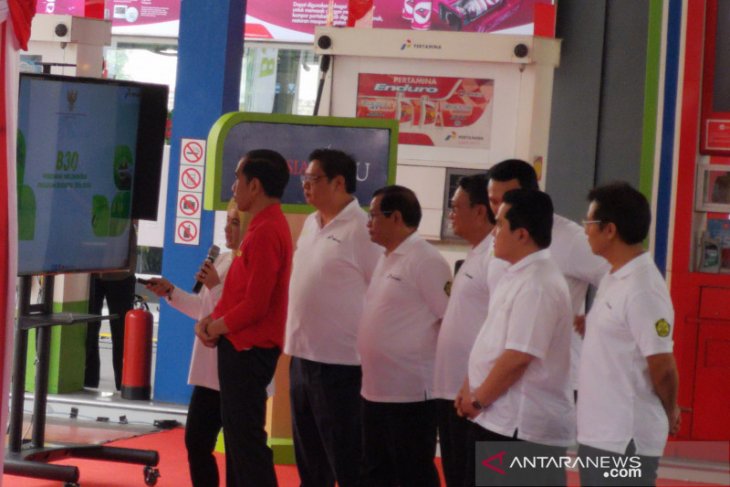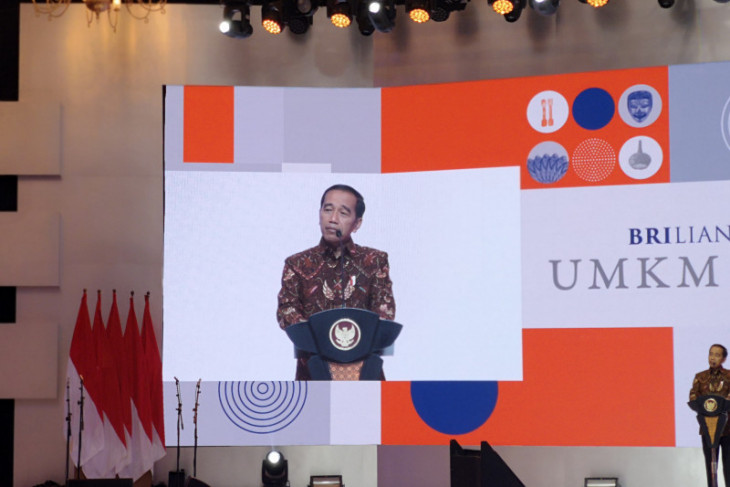Live Streaming
Program Highlight
Company Profile

Ani Hasanah
December

President of Indonesia Joko Widodo (left) and some ministers as well as high-ranking officials of state-owned oil company Pertamina attended the launch ceremony of the first use of 30 percent blended biodiesel (B30) program in Jakarta, Monday (Dec 23, 2019). (ANTARA)
President Joko Widodo (Jokowi) launched the 30 percent blended biodiesel (B30) program at a gas station in Jakarta, Monday, while highlighting that the measure may help Indonesia save US$4.8 billion in foreign exchange in 2020.
"I would like to mention today that the B30 program is officially launched, and I am delighted to announce it will save Rp63 trillion (equivalent to US$4.8 billion) of our foreign exchange," Jokowi stated at the launch ceremony at SPBU Pertamina No.31.128.02 gas station, MT Haryono, South Jakarta.
The president had earlier planned to implement the B30 program in 2020, but he expedited the move by the end of this year.
Jokowi expounded that the B30 program could be implemented in the country's capital city since the trial run had begun since November 2019.
Following the use of B30 blended biodiesel, the president expected to launch the use of 40 percent blended biodiesel (B40) in 2020 and fifty-percent blended biodiesel in 2021. "If we succeed to work at our targets, I believe we may further increase the country's foreign exchange," he stated.
The blended biodiesel program was initiated in 2008 as regulated by Energy and Natural Resources Ministerial Decree No. 32 of 2008. The ministry initially targeted to launch the use of 10 percent blended biodiesel in 2015, with the objective of responding to a sharp decline in the CPO price in the global market in the past years.
The Ministry of Energy and Mineral Resources stated in 2019 that the B20 policy, launched last year, has not only reduced the country’s trade deficit but also saved US$1.66 billion (Rp23.6 trillion) of the country’s foreign exchange reserves during the January-July 2019 period. (ANTARA)
December

The Maritime and Fishery Ministry's Aquaculture Director General, Slamet Soebjakto. (ANTARA)
The Maritime and Fishery Ministry and the UN's Food and Agriculture Organization (FAO) will develop a low-cost catfish (Pangasius Sp.) culture in Indonesia after a pilot project in South Sumatra this year yielded positive result.
Under the "Supporting Local Feed Self-Sufficiency for Inland Aquaculture in Indonesia" project, the ministry and FAO will impart training to farmers on the Pangasius culture to become self-reliant in producing low-cost, high-quality fish feed, the ministry's aquaculture director general, Slamet Soebjakto, noted in a statement received here on Monday.
Soebjakto explained that the project, costing US$257 thousand, aims to boost the production of Pangasius in Indonesia, one of the world's largest catfish producers.
"I believe the self-produced, low-cost fish feed will positively contribute to Pangasius production and its efficiency," he stated.
By increasing the yield, Soebjakto expects Indonesia to soon be able to export Pangasius to markets in the Middle East, Europe, Asia, and the United States.
The farmers' self-produced fish feed, made of silage and palm karnel milk, is of the same quality as the factory-made product, Soebjakto pointed out.
Following the positive result of the program's pilot project in South Sumatra, the ministry is looking forward to the FAO offering continued assistance to Pangasius farmers in the country's other regions to self-produce the low-cost fish feed.
"We will introduce this self-produced fish feed to other Pangasius farmers in the country. We expect that the FAO will continue to support the country's aquaculture industry, mainly in terms of providing solutions to deal with future challenges," he stated.
Apart from the FAO, the ministry's director general also prompted local governments to offer financial support to Pangasius farmers by offering at least 10 percent subsidy in the fish feed production cost. (ANTARA)
December

President Joko Widodo launched the implementation of B30 program in Jakarta on Monday. (Dec 23, 2019).
President Joko Widodo (Jokowi) brought to the fore the basis for expediting the implementation of the biodiesel program until the country could avail the benefits of using B100, or 100 percent biodiesel.
"For me, it is not sufficient only to have B30 biodiesel. I have ordered the ministers and Pertamina to produce B40 by next year and B50 in early 2021," Jokowi remarked at the launch of the B30 program here on Monday.
The head of state spoke of his plan to conduct daily monitoring on the development of the program.
The government has at least three reasons behind speeding up the implementation of its biodiesel program.
Jokowi explained that the first reason was Indonesia’s keenness to seek renewable energy sources and end its dependency on fossil fuel, which, in future, will become depleted.
The development of renewable energy has also demonstrated Indonesia's commitment to preserving planet earth, producing clean energy by reducing carbon emissions, and improving the quality of the environment.
The second motive was the country's continued high dependence on imported fuel oil despite being the world's largest producer of palm oil.
"With such palm oil production potential, we have plenty of sources for biofuel to replace diesel oil," he explained, adding that the potential should be explored further to support national energy resilience and self-sufficiency.
"If we can consistently apply B30 biodiesel, we can save more than Rp63 trillion in foreign exchange," he pointed out.
Thirdly, the president pointed out that the implementation of B30 biodiesel will also step up the demand for domestic crude palm oil and furthermore have a multiplier effect on 16.5 million palm oil farmers in Indonesia.
It means that the B30 biodiesel program will impact small- and medium-scale farmers.
"I remind you here that the key to the success of the B30 biodiesel program or also B100 is whether we can put an end to imports," he stated.
B15 -- a fuel blend of 15 percent palm fatty acid methyl ester and 85 percent of conventional diesel fuel -- was made mandatory in 2015 for diesel-reliant industries.
A year later, B20, which has a bio-content of 20 percent, was produced to replace B15, and the government made it mandatory for the respective industries.
Furthermore, the government has decided that B30 will be made mandatory from January next year.
A decision was taken in August on the policy to make B30 mandatory in 2020 after the European parliament issued a resolution in 2017 to phase out palm oil in biofuel on grounds that it has caused deforestation.
With B30, the government is estimated to save Rp60 trillion from fuel imports in 2020.
If the migration to B30 is successful, President Jokowi is keen that the country begin planning for B50. (ANTARA)
December

President Joko Widodo (Jokowi) at the opening of the UMKM Export BRIllianpreneur 2019 in Jakarta on Friday (ANTARA)
JAKARTA - President Joko Widodo (Jokowi) conceded to the fact that large-scale companies continue to play a dominant role in Indonesia's exports.
"I tell you as it is, large-scale businesses yet contribute to exports," Jokowi remarked at the opening of the micro-, small-, and medium-scale entrepreneurs (UMKM) Export BRIllianpreneur 2019 held here on Friday.
The head of state cautioned that such a situation should not daunt SMEs entrepreneurs since the government had continued to take requisite efforts to spur exports by SMEs.
"I am optimistic about the situation improving the other way round. Currently, large-scale firms contributed 85.6 percent to exports. It is okay. It means that the remaining 14 percent is the contribution of SMEs," he noted.
The president believes that varied efforts, comprising those undertaken by the state-run bank PT Bank Rakyat Indonesia (BRI), can drive the exports of SMEs products.
"When I saw products showcased here. I am optimistic that soon these products would flood the export market if we were to consolidate the market and improve the standard of quality of products to compete with other countries," Jokowi emphasized.
President Director of BRI Sunarso emphasized that UMKM BRIllianpreneur 2019, held on December 20-22, aimed at encouraging SMEs to up their ante to penetrate the export market.
"The event witnessed the participation of 155 SMEs under BRI's coaching in fashion, handicraft, food, and beverages," he stated.
Activities during the event comprised a coaching clinic for SME, training in packaging, UMKM Award, barista competition, and business matching between SME and potential buyers, he revealed. (ANTARA

